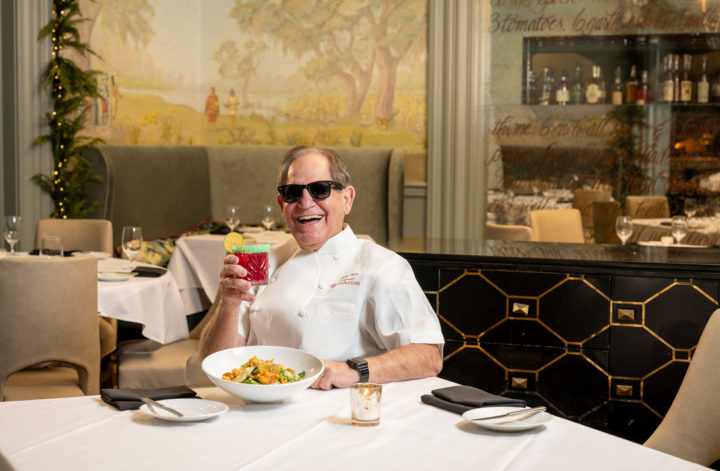“Louisiana’s Culinary Ambassador to the World” John Folse achieved his celebrity status through a well-seasoned blend of diligence, enthusiasm, and providence.
Chef, entrepreneur, food historian, author, and radio and television personality, John Folse has amassed a list of accolades and accomplishments as long as a Louisiana summer. From his successful beginnings at Lafitte’s Landing in Donaldsonville to his white tablecloth, fine dining Restaurant R’evolution in the French Quarter and everything in between, Folse propelled himself forward with his sheer force of (good)will and a little serendipity.
These days, the 77-year-old “culinary ambassador” keeps himself busy attending meetings and events at his various facilities, and spending time at his home in Gonzales with his wife of nearly half a century, Laulie Bouchereau Folse. He also regularly visits Restaurant R’evolution on Bienville Street, a fine dining destination launched over a decade ago with Chicago-based celebrity chef Rick Tramanto.
Just this past fall, the partnership was amicably dissolved and Folse took over the restaurant. “Rick is a tremendous force, a brilliant, brilliant chef,” says Folse. “But he understood R’evolution was really a New Orleans property. It was a good agreement, a gentlemanly handshake, and we’re still very good friends.”
Born on Cabanocey Plantation near Donaldsonville in St. James Parish, Folse and his seven siblings grew up in a tight-knit community of hunters and farmers. His father, Royley Folse was a plant manager at the local sugar co-op and his mother, Therese Zeringue Folse, came from a long line of sugarcane farmers. With “the river at their front door and the swamps out back,” Folse’s family were fortunate to possess the know-how to thrive off of the wildlife available in their bountiful environs. He and his brothers were hunting deer and geese, and catching shrimp and fish well before they reached the ripe old age of ten. “We didn’t have stores to go to so everything we ate came from the swamp floor pantry,” says Folse.
Every Sunday after church, the Folses and their extended family would meet at a hunting camp in the rear of their property for a huge cook-out. “We’d all come together after mass, maybe seven or eight different families, aunts and uncles and cousins, and we all were involved in cooking very early on,” says Folse. Young children would gather food for the fires, while older ones were stirring pots and serving out plates. “We learned how to clean and cook raccoons before we were 10-years-old!” laughs Folse.
John was only 9 when his mother died during childbirth, taking her baby with her. Suddenly a single parent, John’s father struggled to raise his large family when a woman, someone Folse refers to as his “African American Saint” came to their rescue. “One day a woman who lived down the way named Mary Ferchard knocked on the door,” Folse recalls. “My dad answered the door and said ‘Can I help you?’ and she said ‘No, but I can help you.’”
Honoring a promise to John’s mother, Mary took care of the eight Folse children until the youngest graduated from high school. “She was there every morning to make us breakfast and she was there every night to put us to bed.” While his brothers enjoyed the hunt, more often than not, John could be found at Mary’s side in the kitchen. “She took me under her wing,” says Folse. “I was learning how to make turtle soups and sauce piquantes, gumbo and white beans.”
As a teenager, Folse often visited nearby Donaldsonville, a small town which felt like a big city to a young man living in the swamps. He invited a young girl to visit him at his family’s home, but her visit was cut short when she ran off without a word. When Folse saw her later on, he asked why she ran away. “She said ‘Well, when you opened the ice box, everything had fur and fins and feathers, and I just wanted to get the hell out of there!’ That was our pantry – fur, fins and feathers!” laughs Folse.
Before launching his first restaurant, Folse was working as a hotel manager at the Capitol House Hotel, now the Hilton Baton Rouge Capitol Center. During that time, the hotel hired Fritz Blumberg, a chef from Munich, Germany, to head the hotel’s restaurant. Naturally, whenever he could, Folse would find himself in the kitchen watching the classically-trained chef cook until one day Blumberg asked for his help. “He said ‘show me how to cook the foods you grew up with,’” says Folse. “I said ‘I’m not really a chef, but I could do a little turtle sauce piquant for ya, I can do you a little gumbo.’” Over the next four days, John prepared dish after dish from his childhood for Blumberg, until finally the chef told him to take off his coat and tie, put on a chef’s coat and join him in the kitchen.
Over the next year, Blumberg and Folse were apprenticed to one another, the trained chef was taught about the region’s Cajun and Creole cuisine, while Folse learned classic culinary recipes and techniques. Everyone who dined in the hotel benefited from their collaboration, including Folse’s future investor, a banker named Ruth Newcomer. “One day she came to me and said ‘John, do you see that rathskeller right across 3rd Street?’” said Folse. “We’ve been watching you in the dining room and, if you’re interested, we’ll fund you for one year.” Newcomer encouraged the bright young chef, investing money and faith in Folse’s potential. Within a year, John was closing down 3rd Street to host the annual Legislative Cook-Off. “She saw it in me to do something I would’ve never done on my own,” says Folse. Ruth Newcomer also helped Folse launch Lafitte’s Landing, and the rest, as they say, is history.
As a man devoted to his heritage and the rich food culture in which he was raised, Folse wanted nothing more than to share his love of Louisiana, and his restaurant Lafitte’s Landing, with the world. In a unique marketing effort, he cooked étouffée, jambalaya and gumbo for people across the globe and, most notably, was the first restaurant to open the Presidential Summit in Moscow between Ronald Reagan and Mikhail Gorbachev in 1988. “The summit was successful, wasn’t it? I like to think I had a lot to do with that!” laughs Folse. John also was the first non-Italian to create the Vatican State Dinner in Rome, served a record-breaking crawfish boil in Denmark, and spearheaded a Gulf seafood campaign at the 2012 London Olympics. “I always want to serve the things that represent Louisiana best,” says Folse. “I always love to make a big bowl of gumbo and a crawfish étouffée.”
Folse went on to launch his own company which included a publishing arm from which he released numerous cookbooks, including his 8th , and possibly his most iconic tome After the Hunt: Louisiana’s Authoritative Collection of Wild Game and Game Fish Cookery. The company expanded and now includes a bakery division led by award-winning pastry chef David Harris, and a USDA food manufacturing plant, both located in Gonzales. Folse also operates White Oak Estate & Gardens, what he calls the “fine dining” arm of the company, a branch specializing in high-end catering services in Baton Rouge. “I do not have children but I have a tremendous amount of people whom I call my children,” says Folse, referring to longtime employees, co-workers, and partners. “As far as I’m concerned, those are my kin. They are family to me.”
*Article originally published in the March 2024 issue of Where Y’at Magazine
**Lead image courtesy of Romney Caruso



